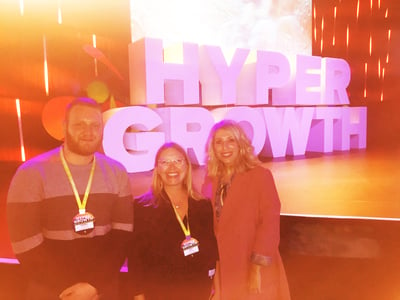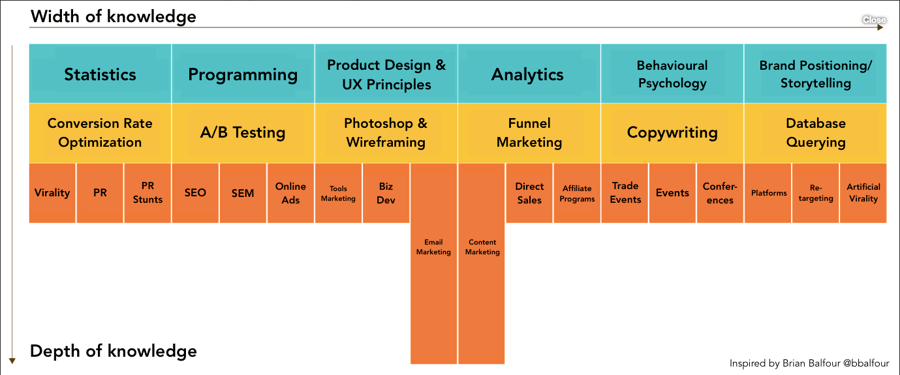Everything you need to know if you missed Hypergrowth 2019
Everything you need to know if you missed Hypergrowth 2019
Last week, Drift hosted their annual event – Hypergrowth 2019 – in London. This meant that four lucky members of the ESM Inbound team were able to attend. It was a day of fascinating talks, brand-new information and thought-provoking reflections: we came away with so many ideas, our heads were bursting!

But the joy of these events for us isn’t only coming away with new inspiration for ourselves and our business, but to share this remarkable content with others, too. We want to help you spark creative changes in your own business, so here are five of the best things we learnt from Hypergrowth 2019. Nb: if you pass these ideas off as your own to your team, we won’t judge…
Takeaway #1: Pace yourself
By Olympic athlete, Victoria Pendleton
The first speaker of the day was gold-medal winning Olympic cyclist, Victoria Pendleton who explored how to apply an athlete’s thinking to business. Having gone through some of the most challenging tests of endurance in her career, physically and mentally, Victoria had plenty of advice to share:
“Approach mental training the same way you’d approach physical training – it’s smart to ask for help.”
She really promoted the concept that the best ideas come from collaboration, and it doesn’t make you weak to admit you need the input of others. She backed this up by expressing that emotions give us strength and a human quality in business – we aren’t robots. Attitudes to this are certainly shifting in the workplace:
“Wearing my heart on my sleeve and being emotional actually makes me powerful. People have a specific idea of what they want you to be – and I’m going to get the job done, but my way.”
When visualising a goal, she advised to accept your starting point, rather than only focusing on the end result. This way, you don’t expect too much of yourself too soon, or quit because you aren’t making progress fast enough. Victoria said:
“Start where you are, not where you want to be.”
Takeaway #2: Find human connections
By Founder and CEO of Inkpact, Charlotte Pearce
The next talk was a fascinating exploration of the human side of business with Charlotte Pearce. Inkpact specialise in producing hand-written notes and adding personalisation in a world that has largely forgotten about the little touches. She wanted to encourage us all to find small ways to make big connections with our customers:
“Humans are at the heart of our world – and our businesses. What makes us happy – despite all our technological developments – hasn’t changed.”
Charlotte invited us to strip back our businesses to the very core: what are the fundamentals of our companies? Why do we do what we do? For all of us, it comes down to customers, and customers need to feel loved and valued:
“Customers are no longer the end of a transaction – they’re the beginning. They’re the input, not the output.”
Hand-written notes and personalised gifts might not be an option for many of us (though Inkpact specialise in corporate projects, too!) but that same level of care, attention and customisation can still be at the heart of everything we do – from the way we speak to customers on the phone, to the language we use in emails and the interactions we share on social media. Like Victoria Pendleton’s message, Charlotte advised us to:
“Get vulnerable. Put yourself out there. Make sure you listen and don’t talk too much. People will forget what you said. They’ll forget what you did. But they won’t forget how you made them feel.”
And isn’t this true? Think back to some of your happiest moments, or even your most painful ones. Often the words or actions themselves are lost in a blur, but the emotion itself, even years later, can still feel as vivid. She finished with a powerful reminder:
“Future businesses are the ones who care about people: forget B2B or B2C, the future is human to human.”
Takeaway #3: Don’t be a spork
By Founder and CEO of DigitalMarketer, Ryan Deiss
Ryan Deiss’ energy-packed presentation focused on the sheer volume of roles covered by the term ‘marketing’ now. It’s nearly impossible to say you’re simply ‘a marketer’ because it covers so many diverse skills – as Ryan said himself:
“Marketers today only need to be good at… EVERYTHING. This isn’t helpful. Marketers are becoming sporks: don’t be a spork! All this achieves is doing everything badly.”

He continued that if you try to do everything on the T-shaped marketing diagram above, you’ll end up doing most of it poorly – that’s if you even manage to cover it all. Ryan’s point was that, although all these elements make up modern marketing, your business doesn’t need to do all of them. Across your team, you will have a range of specialisms to use, but mostly, focus on your customers – what are they telling you they need?
“I am not interested in what marketers think is cool; I am only interested in what our customers think is cool...fall in love with your customer and follow them where they are.”
If your customers aren’t on Instagram, then don’t arbitrarily open an account just because it seems like that’s what other businesses are doing. He argued that you need sincere empathy about your customers: get inside their heads. His closing message resonated with us and supported Charlotte Pearce’s earlier point:
“Listen first. Talk to real people – 50 prospects and 50 customers – do this so that you don’t confuse the reasons people buy, with the reasons people stay. Talk to people at trade shows, pick up the phone, no matter how you do it: talk.”
Takeaway #4: Keep your mind open
By Chief Marketing & Customer Officer at Harrods, Amanda Hill
One of the themes for the day was collaboration. As with previous speakers, the impressive Amanda Hill wanted to share her tips for keeping your mind open to new possibilities, including the input of others:
“History has proven the best ideas and most significant moments have come from lots of people coming together.”
Even after all her years of experience, working for prestigious brands such as Harrods, BBC and L’Oreal, Amanda explained that she can feel doubtful of her own abilities. To cope with moments of uncertainty, she recommends trying to keep your mind open to possibilities in the way a child would. The more we see the world as a child sees it, the more opportunities we open ourselves up to:
“If you give a child a cup, they’ll come up with 100 uses for it. The older we get, the less imaginative we become, and more fixed in our views and parameters.”
The most important point Amanda shared was to be kind to ourselves and others in business. Work hard, but don’t miss the moments of celebration because you’re too busy focusing on the next challenge:
“When the trajectory of your career is on the up, it takes a lot of fuel. So take note of the things that bring joy and satisfaction. Remember to pause.”
Takeaway #5: It’s okay to change
By Founder and CEO of HubSpot, Brian Halligan
The focus of Brian Halligan’s presentation was that HubSpot has had to change and evolve to move with their customers – even doing things they said they never would. His message was that it’s okay to change your mind, your standpoint and your product if it’s what the customer wants:
“Telling customers not to use anything but HubSpot was like trying to push a rock up a hill. So now our integrations are through the roof. We thought – let’s turn our enemies into our friends by integrating with hundreds of apps that businesses are using.”
Even huge, successful companies like HubSpot hit barriers, which Brian was open about – and personas are a key part of every business. They recently changed their persona focus to broaden their business to a new audience:
“We were struggling with personas. We went back and forth about which persona we wanted to focus on. We could have chosen any of the three we had, but just making a choice helps so much. It allows you to say “No” – selling isn’t about saying “Yes”, it’s about “No”.”
HubSpot prides itself on being a shining inbound-marketing example, promoting and using inbound methods. So it was a surprise to hear that they’re trialling a traditionally outbound method in San Francisco: billboards! This decision was made after listening to customers and deciding to change, according to their geography. Brian explained:
“We now have 12 billboards in San Francisco. People think it’s outbound marketing, but I disagree. It wouldn’t work everywhere – in Boston, or London, or Dublin. But in San Francisco, billboards are a huge deal. All our competitors have headquarters there and billboards bring joy to those sat on the freeway; that’s why I think in this case they’re inbound.”
By adapting to a specific audience, HubSpot is now seeing an increase in brand awareness in the San Francisco area. A few years ago, they wouldn’t have considered this advertising tactic, but by being open to change, looking at competition and listening to customers, they’re willing to turn their previous advice on its head and use it to target a new audience.
Our favourite tips
After an intense and jam-packed day at Hypergrowth 2019, it was great to take some time to process the advice we’d heard. We hope you’ve read something that you can apply at your own business (and that just might impress your team).
Our takeaway summary:
- Pace yourself – know where your beginning point is. Measure at the start, then take it from there; don’t try to do too much too soon.
- Make human connections – the biggest message of the day, which spread across every talk we heard. Put humans back at the centre of your business.
- Don’t be a spork – there’s so much to cover in marketing now that if you try to do it all, you’ll do it badly. Only focus on what will resonate with your customers.
- Keep your mind open – try to apply a childlike wonder to your business. Embrace new ideas and ways of doing things: how many uses can you find for a cup?
- It’s okay to change – it doesn’t mean you’re diluting your brand or being fickle: you’re listening to the space you’re in, your competitors and customers. It’s a smart move.
Our content includes affiliate links. This means that we may receive a commission if you make a purchase through one of the links on our website. This will be at no cost to you and helps to fund the content creation work on our website.

